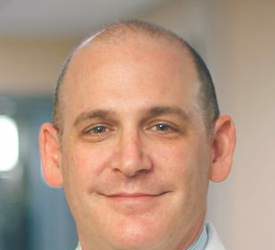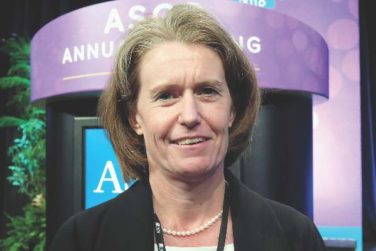AT THE 2017 GASTROINTESTINAL CANCERS SYMPOSIUM
SAN FRANCISCO (FRONTLINE MEDICAL NEWS) – The human monoclonal IgG4 antibody nivolumab was safe and effective as a salvage treatment for patients in a randomized phase III trial who failed standard chemotherapy for advanced gastric or gastroesophageal junction cancer.
Nivolumab, which blocks the human programmed cell death-1 receptor, was superior to placebo with respect to overall survival, progression-free survival, and overall response rate, Yoon-Koo Kang, MD, reported at the symposium sponsored by ASCO, ASTRO, the American Gastroenterological Association, and the Society of Surgical Oncology.
For the study ( ONO-4538 ), 493 patients with ECOG performance status of 0-1 and unresectable advanced or recurrent advanced gastric or gastroesophageal cancer who failed 2 or more prior chemotherapy regimens were randomized to receive placebo or nivolumab in a 2:1 ratio. Nivolumab treatment was associated with significantly improved median overall survival at the time of data cut-off 5.6 months after the last patient was randomized (5.32 months vs. 4.14 months with placebo; hazard ratio, 0.63), said Dr. Kang of Asan Medical Center, University of Ulsan, Seoul, Korea.
The overall survival rate at 12 months was 26.6% vs. 10.9%, respectively, he said.
The overall response rate was 11.2% vs. 0%, and median progression-free survival was 1.61 months vs. 1.45 months (hazard ratio, 0.60) with nivolumab vs. placebo, respectively.
“Median duration of response was 9.53 months,” he said.
Study subjects were adults aged 20 years or older who were enrolled from 49 centers in Japan, Korea, and Taiwan. The 330 patients in the nivolumab group received 3 mg/kg every 2 weeks until toxicity became unacceptable or disease progressed. Treatment-related adverse events occurred in 42.7% vs. 26.7% of nivolumab and placebo group patients, respectively, and grade 3 or greater events occurred in 11.5% vs. 5.5%, respectively.
Grade 3 or 4 events reported in more than 2% of patients were diarrhea, fatigue, decreased appetite, pyrexia, and increased AST and ALT in the treatment group, and fatigue and decreased appetite in the placebo group. The rates of discontinuation of active treatment due to drug-related adverse events were similar at 2.7% and 2.5% in the groups, respectively, he said, noting that the safety profile was consistent with findings in prior studies involving patients with solid tumors.
The findings demonstrate a clinical benefit with nivolumab in pretreated advanced or recurrent gastric cancer, and establish a strong basis for conducting additional studies of the drug in such patients, he concluded.
ONO-4538 was funded by Ono Pharmaceutical Co., Ltd. and Bristol-Myers Squibb. Dr. Kang reported a consulting or advisory role with Lilly/ImClone, Novartis, Ono Pharmaceutical, Roche/Genentech, and Taiho Pharmaceutical, and research funding from Bayer, Novartis, and Roche/Genentech.




